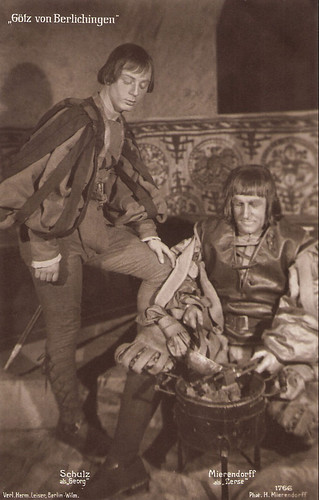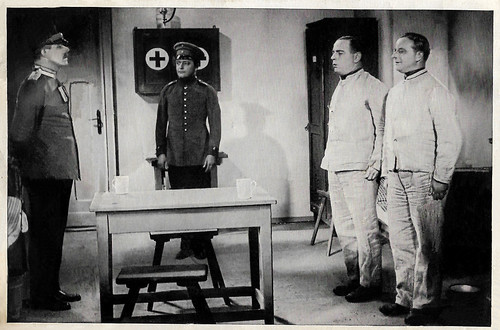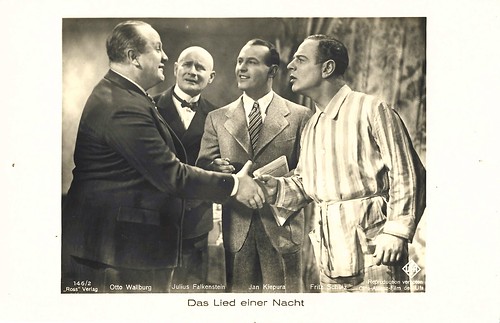Austrian-born comic actor/director Fritz Schulz (1896 - 1972) appeared in more than one hundred films between 1917 and 1970. When the sound film arrived, he was one of the most popular stars of the Ufa. The rise of the Nazis broke his blooming career.

German postcard by Ross Verlag, no. 6159/1, 1931-1932. Photo: Mac Glass-Filmprod.

German cigarette card for Hänsom cigarettes by Jasmatzi Cigarettenfabrik G.M.b.H., Dresden / Ross Verlag, Film Series 4 'Aus tönenden Filmen' (From sound films), no. 601. Photo: Ufa. Paul Heidemann and Fritz Schulz in Dienst ist Dienst / Duty is Duty (Carl Boese, 1931).

German postcard by Ross Verlag, no. 128/3. Photo: Aaafa Film. Hans Heinz Bollmann as Symon and Fritz Schulz as Jan Der Bettelstudent / The Beggar Student (Victor Janson, 1931).
Fritz Schulz was born in Karlsbad, Austria-Hungary (now Karlovy Vary, Czech Republic), in 1896. He began his film career in the 1910s with German silent films like the short comedy Fräulein Puppe - meine Frau / Miss Puppet – My Wife (Danny Kaden, 1914) with Gudrun Hildebrandt.
He appeared in the Joe Deebs adventure Das Geheimnis der leeren Wasserflasche / The Secret of the Empty Water Bottle (Joe May, 1917) starring Harry Liedtke, another Joe Deebs mystery Der Onyxknopf / The Onyx Button (Joe May, 1917) now with Max Landa, and the great comedy Wenn vier dasselbe tun / When Four Do the Same (Ernst Lubitsch, 1917) starring Emil Jannings and Ossi Oswalda.
He also acted in the Fyodor Dostoevsky adaptation Anna Karenina (Friedrich Zelnik aka Frederic Zelnik, 1919) starring Lya Mara and the controversial Anders als die Anderen / Different from the Others (Richard Oswald, 1919), one of the first films to depict homosexuality.
In the 1920s, supporting roles in a whole string of other well-known films followed, like the Krimi Whitechapel (Ewald André Dupont, 1920), the drama Miss Beryll... die Laune eines Millionärs / Miss Beryll… the Whims of a Millionaire (Friedrich Zelnik aka Frederic Zelnik, 1921) with Lya Mara, and Sie und die Drei / She and the Three (Ewald André Dupont, 1922) starring Henny Porten.
His other silent films included Der rote Reiter / The Red Rider (Franz W. Koebner, 1923) starring Fern Andra, Die Frau mit dem Etwas / The Woman with It (Erich Schönfelder, 1925) with Lee Parry, and Gesetze der Liebe / Laws of Love (Magnus Hirschfeld, Richard Oswald, 1927), which contained newly edited material from Anders als die andern (1919).

German postcard by Hermann Leiser, Berlin, no. 1766. Photo: Hans Mierendorff. Fritz Schulz as Georg and Hans Mierendorff as Lerse in the stage play 'Götz von Berlichingen', a successful 1773 drama by Johann Wolfgang von Goethe, based on the memoirs of the historical adventurer-poet Gottfried or Götz von Berlichingen.

German postcard by Photochemie, Berlin, no. K. 2008. Photo: Union-Film. Ossi Oswalda as the girl, Fritz Schulz (here on the left) as her lover, and Emil Jannings as her father (here on the right) in Wenn vier dasselbe tun / When Four Do the Same (Ernst Lubitsch, 1917).

German collector card by Ross Verlag in the series Vom Werden Deutscher Filmkunst - Der Stumme Film, picture no. 34, group 43. Photo: Union-Film. Pola Negri and Fritz Schulz in Die Marchesa d'Armiani (Alfred Halm, 1920).

German collector card in the series 'Vom Werden deutscher Filmkunst - Der Tonfilm', album no. 11, picture no. 139, group 44. Photo: Ufa / Ross Verlag. Fritz Schulz and Paul Heidemann in Dienst ist Dienst / Duty is Duty (Carl Boese, 1931).
In contrast to many of his colleagues of the silent cinema, Fritz Schulz was offered more extensive roles with the rise of the sound film era. During the first years of the 1930s he starred in a great number of comedies and operettas, among them Mein Herz gehört Dir.... / My Heart is Yours (Max Reichmann, 1930) with Camilla Horn, Nur Du / Only You (Hermann Feiner, Willi Wolff, 1930), and Drei Tage Mittelarrest / Three Days in Jail (Carl Boese, 1930).
Then followed roles in Pension Schöller / Guesthouse Schöller (Georg Jacoby, 1930), Kasernenzauber / Magic of the Barracks (Carl Boese, 1930) with Lucie Englisch, Der Bettelstudent / The Beggar Student (Victor Janson, 1931) with Truus van Aalten, Die schwebende Jungfrau / The Soaring Maiden (Carl Boese, 1931) with Lissi Arna, Der verjüngte Adolar / Adolar Rejuvenated (Georg Jacoby, 1931) starring Hans Moser, and Das Lied einer Nacht / The Song of Night (Anatole Litvak, 1932) with Jan Kiepura.
Before Hitler's rise to power in Germany, Fritz Schulz returned to Austria. There he made more comedies and musicals like Sehnsucht 202 / Yearning 202 (Max Neufeld, 1932) with Magda Schneider, Sag' mir, wer Du bist / Say me Who You Are (Georg Jacoby, 1933) starring Liane Haid and the British film version of 'Die Fledermaus', Waltz Time (Wilhelm Thiele, 1933) with Evelyn Laye. In Great Britain, he also appeared in The Constant Nymph (Basil Dean, 1933) with Brian Aherne.
The National Socialist regime began to infiltrate Austria's film industry to force it to conform to Nazi ideology and provoke the destabilisation of the country for an eventual Nazi coup or invasion. Only eight films a year were allowed into Germany, which had been Austria's greatest export market. No Jewish or anti-Nazi talent was to be present in these films. Many Jewish film workers began to produce their own German-language films.
Fritz Schulz, Rudi Loewenthal and Erich Morawsky founded the first independent production company in 1934. Their film was called Salto in die Seligkeit / Sommersault in Bliss (Fritz Schulz, 1934) with Rose Barsony. But only one year later, after Fritz Schulz had directed Ende schlecht, alles gut / All's Well That Ends Badly (1934) with Szöke Szakáll aka S.Z. Sakall, and Letzte Liebe / Last Love (1935) with Albert Bassermann, the founders had to shut down their production company.

Austrian postcard by Iris Verlag, no 6076. Photo: Lux Film.

Austrian postcard by Iris-Verlag, no. 6538. Photo: Lux Film Verl. Fritz Schulz and Truus van Aalten in Der Bettelstudent / The Beggar Student (Victor Janson, 1931).

German postcard by Ross Verlag, no. 146/1. Photo: Cine-Allianz-Film der Ufa. Fritz Schulz and Magda Schneider in Das Lied einer Nacht / The Song of Night (Anatole Litvak, 1932).

German postcard by Ross Verlag, no. 146/2. Photo: Cine-Allianz-Film der Ufa. Otto Wallburg, Julius Falkenstein, Jan Kiepura and Fritz Schulz in Das Lied einer Nacht / The Song of Night (Anatole Litvak, 1932).
During the second half of the 1930s and the 1940s, Fritz Schulz lived in Switzerland and appeared in only one film. The once celebrated Ufa star appeared in a supporting part in Dilemma (Edmund Heuberger, Paul Besson, 1940) with Leopold Biberti.
After the war, it lasted five years till Schulz returned to the cinema. He directed the musical Gruss und Kuss aus der Wachau / Greetings and Kiss from the Wachau (1950) starring Rolf Wanka.
He later appeared in supporting parts in such Austrian films as the entertaining comedy Ich und meine Frau / I and My Wife (Eduard von Borsody, 1953) with Attila Hörbiger and Paula Wessely, Dieses Lied bleibt bei Dir / Cabaret (Willi Forst, 1954) starring Paul Henreid, the comedy Die Wirtin zur Goldenen Krone / The Landlady of the Golden Crown (Theo Lingen, 1955) and another comedy Die unvollkommene Ehe / The Defective Marriage (Robert A. Stemmle, 1959) starring Paula Wessely.
On German and Austrian TV, he was seen in Moral (Rainer Wolffhardt, 1958), the great comedy Der Hauptmann von Köpenick / The Captain from Koepenick (Rainer Wolffhardt, 1960) with Rudolph Platte, Der Apoll von Bellac / The Apollo of Bellac (Ulrich Erfurth, 1964) based on the play by Jean Giraudoux, the comedy 'S Wiesenhendl (Kurt Wilhelm, 1968) and Einladung ins Schloss / Ring Round the Moon (Helmut Käutner, 1970).
On television, he also starred in the comedy series Zimmer 13 / Room 13 (1968). In 1970, he retired from show business. Fritz Schulz died in Zurich, Switzerland, in 1972.

German postcard by Ross Verlag, no. 7199/1, 1932-1933. Photo: Esterhazy.

German postcard by Ross Verlag, no. 8086/2, 1933-1934. Photo: Atelier Binder, Berlin.

Dutch postcard by JosPe, no. 407. Photo: Filma.
Scene from Einer Frau muss man alles verzeih'n / You Should Forgive a Woman Everything ( Eugen Thiele, 1931). Source: Plattensammler88 (YouTube).
Sources: Thomas Staedeli (Cyranos), Green Cine (Now defunct), Wikipedia (German), AllMovie (Page now defunct) and IMDb.
This post was last updated on 25 August 2025.

German postcard by Ross Verlag, no. 6159/1, 1931-1932. Photo: Mac Glass-Filmprod.

German cigarette card for Hänsom cigarettes by Jasmatzi Cigarettenfabrik G.M.b.H., Dresden / Ross Verlag, Film Series 4 'Aus tönenden Filmen' (From sound films), no. 601. Photo: Ufa. Paul Heidemann and Fritz Schulz in Dienst ist Dienst / Duty is Duty (Carl Boese, 1931).

German postcard by Ross Verlag, no. 128/3. Photo: Aaafa Film. Hans Heinz Bollmann as Symon and Fritz Schulz as Jan Der Bettelstudent / The Beggar Student (Victor Janson, 1931).
Different from the others
Fritz Schulz was born in Karlsbad, Austria-Hungary (now Karlovy Vary, Czech Republic), in 1896. He began his film career in the 1910s with German silent films like the short comedy Fräulein Puppe - meine Frau / Miss Puppet – My Wife (Danny Kaden, 1914) with Gudrun Hildebrandt.
He appeared in the Joe Deebs adventure Das Geheimnis der leeren Wasserflasche / The Secret of the Empty Water Bottle (Joe May, 1917) starring Harry Liedtke, another Joe Deebs mystery Der Onyxknopf / The Onyx Button (Joe May, 1917) now with Max Landa, and the great comedy Wenn vier dasselbe tun / When Four Do the Same (Ernst Lubitsch, 1917) starring Emil Jannings and Ossi Oswalda.
He also acted in the Fyodor Dostoevsky adaptation Anna Karenina (Friedrich Zelnik aka Frederic Zelnik, 1919) starring Lya Mara and the controversial Anders als die Anderen / Different from the Others (Richard Oswald, 1919), one of the first films to depict homosexuality.
In the 1920s, supporting roles in a whole string of other well-known films followed, like the Krimi Whitechapel (Ewald André Dupont, 1920), the drama Miss Beryll... die Laune eines Millionärs / Miss Beryll… the Whims of a Millionaire (Friedrich Zelnik aka Frederic Zelnik, 1921) with Lya Mara, and Sie und die Drei / She and the Three (Ewald André Dupont, 1922) starring Henny Porten.
His other silent films included Der rote Reiter / The Red Rider (Franz W. Koebner, 1923) starring Fern Andra, Die Frau mit dem Etwas / The Woman with It (Erich Schönfelder, 1925) with Lee Parry, and Gesetze der Liebe / Laws of Love (Magnus Hirschfeld, Richard Oswald, 1927), which contained newly edited material from Anders als die andern (1919).

German postcard by Hermann Leiser, Berlin, no. 1766. Photo: Hans Mierendorff. Fritz Schulz as Georg and Hans Mierendorff as Lerse in the stage play 'Götz von Berlichingen', a successful 1773 drama by Johann Wolfgang von Goethe, based on the memoirs of the historical adventurer-poet Gottfried or Götz von Berlichingen.

German postcard by Photochemie, Berlin, no. K. 2008. Photo: Union-Film. Ossi Oswalda as the girl, Fritz Schulz (here on the left) as her lover, and Emil Jannings as her father (here on the right) in Wenn vier dasselbe tun / When Four Do the Same (Ernst Lubitsch, 1917).

German collector card by Ross Verlag in the series Vom Werden Deutscher Filmkunst - Der Stumme Film, picture no. 34, group 43. Photo: Union-Film. Pola Negri and Fritz Schulz in Die Marchesa d'Armiani (Alfred Halm, 1920).

German collector card in the series 'Vom Werden deutscher Filmkunst - Der Tonfilm', album no. 11, picture no. 139, group 44. Photo: Ufa / Ross Verlag. Fritz Schulz and Paul Heidemann in Dienst ist Dienst / Duty is Duty (Carl Boese, 1931).
The emigrant cinema
In contrast to many of his colleagues of the silent cinema, Fritz Schulz was offered more extensive roles with the rise of the sound film era. During the first years of the 1930s he starred in a great number of comedies and operettas, among them Mein Herz gehört Dir.... / My Heart is Yours (Max Reichmann, 1930) with Camilla Horn, Nur Du / Only You (Hermann Feiner, Willi Wolff, 1930), and Drei Tage Mittelarrest / Three Days in Jail (Carl Boese, 1930).
Then followed roles in Pension Schöller / Guesthouse Schöller (Georg Jacoby, 1930), Kasernenzauber / Magic of the Barracks (Carl Boese, 1930) with Lucie Englisch, Der Bettelstudent / The Beggar Student (Victor Janson, 1931) with Truus van Aalten, Die schwebende Jungfrau / The Soaring Maiden (Carl Boese, 1931) with Lissi Arna, Der verjüngte Adolar / Adolar Rejuvenated (Georg Jacoby, 1931) starring Hans Moser, and Das Lied einer Nacht / The Song of Night (Anatole Litvak, 1932) with Jan Kiepura.
Before Hitler's rise to power in Germany, Fritz Schulz returned to Austria. There he made more comedies and musicals like Sehnsucht 202 / Yearning 202 (Max Neufeld, 1932) with Magda Schneider, Sag' mir, wer Du bist / Say me Who You Are (Georg Jacoby, 1933) starring Liane Haid and the British film version of 'Die Fledermaus', Waltz Time (Wilhelm Thiele, 1933) with Evelyn Laye. In Great Britain, he also appeared in The Constant Nymph (Basil Dean, 1933) with Brian Aherne.
The National Socialist regime began to infiltrate Austria's film industry to force it to conform to Nazi ideology and provoke the destabilisation of the country for an eventual Nazi coup or invasion. Only eight films a year were allowed into Germany, which had been Austria's greatest export market. No Jewish or anti-Nazi talent was to be present in these films. Many Jewish film workers began to produce their own German-language films.
Fritz Schulz, Rudi Loewenthal and Erich Morawsky founded the first independent production company in 1934. Their film was called Salto in die Seligkeit / Sommersault in Bliss (Fritz Schulz, 1934) with Rose Barsony. But only one year later, after Fritz Schulz had directed Ende schlecht, alles gut / All's Well That Ends Badly (1934) with Szöke Szakáll aka S.Z. Sakall, and Letzte Liebe / Last Love (1935) with Albert Bassermann, the founders had to shut down their production company.

Austrian postcard by Iris Verlag, no 6076. Photo: Lux Film.

Austrian postcard by Iris-Verlag, no. 6538. Photo: Lux Film Verl. Fritz Schulz and Truus van Aalten in Der Bettelstudent / The Beggar Student (Victor Janson, 1931).

German postcard by Ross Verlag, no. 146/1. Photo: Cine-Allianz-Film der Ufa. Fritz Schulz and Magda Schneider in Das Lied einer Nacht / The Song of Night (Anatole Litvak, 1932).

German postcard by Ross Verlag, no. 146/2. Photo: Cine-Allianz-Film der Ufa. Otto Wallburg, Julius Falkenstein, Jan Kiepura and Fritz Schulz in Das Lied einer Nacht / The Song of Night (Anatole Litvak, 1932).
Switzerland
During the second half of the 1930s and the 1940s, Fritz Schulz lived in Switzerland and appeared in only one film. The once celebrated Ufa star appeared in a supporting part in Dilemma (Edmund Heuberger, Paul Besson, 1940) with Leopold Biberti.
After the war, it lasted five years till Schulz returned to the cinema. He directed the musical Gruss und Kuss aus der Wachau / Greetings and Kiss from the Wachau (1950) starring Rolf Wanka.
He later appeared in supporting parts in such Austrian films as the entertaining comedy Ich und meine Frau / I and My Wife (Eduard von Borsody, 1953) with Attila Hörbiger and Paula Wessely, Dieses Lied bleibt bei Dir / Cabaret (Willi Forst, 1954) starring Paul Henreid, the comedy Die Wirtin zur Goldenen Krone / The Landlady of the Golden Crown (Theo Lingen, 1955) and another comedy Die unvollkommene Ehe / The Defective Marriage (Robert A. Stemmle, 1959) starring Paula Wessely.
On German and Austrian TV, he was seen in Moral (Rainer Wolffhardt, 1958), the great comedy Der Hauptmann von Köpenick / The Captain from Koepenick (Rainer Wolffhardt, 1960) with Rudolph Platte, Der Apoll von Bellac / The Apollo of Bellac (Ulrich Erfurth, 1964) based on the play by Jean Giraudoux, the comedy 'S Wiesenhendl (Kurt Wilhelm, 1968) and Einladung ins Schloss / Ring Round the Moon (Helmut Käutner, 1970).
On television, he also starred in the comedy series Zimmer 13 / Room 13 (1968). In 1970, he retired from show business. Fritz Schulz died in Zurich, Switzerland, in 1972.

German postcard by Ross Verlag, no. 7199/1, 1932-1933. Photo: Esterhazy.

German postcard by Ross Verlag, no. 8086/2, 1933-1934. Photo: Atelier Binder, Berlin.

Dutch postcard by JosPe, no. 407. Photo: Filma.
Scene from Einer Frau muss man alles verzeih'n / You Should Forgive a Woman Everything ( Eugen Thiele, 1931). Source: Plattensammler88 (YouTube).
Sources: Thomas Staedeli (Cyranos), Green Cine (Now defunct), Wikipedia (German), AllMovie (Page now defunct) and IMDb.
This post was last updated on 25 August 2025.
No comments:
Post a Comment